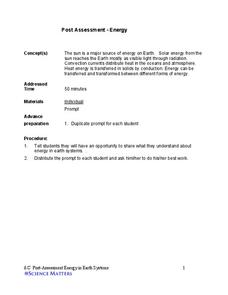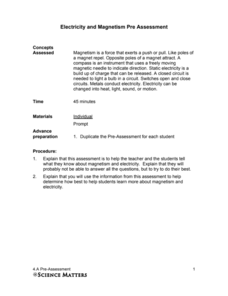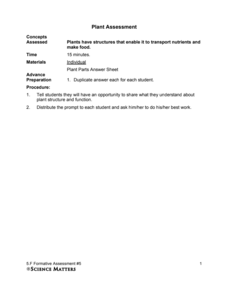College Board
2000 AP® Computer Science A Free-Response Questions
Coding works for other fields. The free-response questions for AP Computer science require pupils to develop code to solve a problem. Problems range from creating a histogram to developing an encryption program. Teachers use the...
College Board
2008 AP® Computer Science A Free-Response Questions
Get the code right. A detailed resource provides pupils and teachers of computer science courses with released items from the 2008 exam. Questions range from studying code in a case study to creating code to perform specific tasks....
Teach Engineering
Introduction to Environmental Engineering
A series on environmental engineering introduces the class to issues that environmental engineers work to solve. This first lesson focuses on air and land issues, and looks at ways to reduce pollution.
Science Matters
Formative Assessment #1: Structure/Function
Just because you taught it doesn't mean they learned it! Use a quick formative assessment to check for understanding and ensure all individuals understand the role of structure and function. The lesson is the fourth in a larger series on...
Science Matters
Electricity and Magnetism Formative Assessment #1
A formative assessment is a great tool for planning further instruction. The fifth lesson of a 14-part series exploring magnetism and electricity provides questions to gauge current understanding of magnetic fields, compasses, and...
Science Matters
Earthquake Waves: Wave Notes
A multi-part lesson opens with a review of p waves and s waves. Then scholars use a simple s wave simulator to view the way the wave travels. Next, pupils use cups and various fluids to simulate p waves moving through different...
Science Matters
Spaghetti Fault Model
Does increasing the pressure between two moving plates provide a stabilizing force or create more destruction? The hands-on lesson encourages exploration of strike-split fault models. The sixth lesson in a 20-part series asks...
Chicago Botanic Garden
Reflecting on What I Learned About Climate Change
After three eye-opening lessons about our environment, scholars revisit a 10-question survey, reflect on their new-found knowledge, and take action by writing to a representative or creating a public service announcement about...
Science Matters
Earthquakes and Volcanoes Pre-Assessment
See how much your class knows about earthquakes and volcanic activity and how these events shape geologic features. The first lesson in the series of 20 is a pre-test to find out what pupils already know. It includes 10 vocabulary...
Science Matters
Post-Assessment Energy
After nine lessons and activities about energy, here is the final assessment. The 20-questions include multiple choice, multiple choice with justification, short answer, answer analysis, and labeling diagrams to challenge learners.
Science Matters
Earthquakes and Volcanoes Post Assessment
The final lesson in the 20-part series is a post assessment covering earthquakes and volcanoes. Twenty-three questions incorporate each of the previous lessons through multiple choice, justified multiple choice, expanded multiple choice,...
Science Matters
Electricity and Magnetism Formative Assessment #2
Leave it to science to get scholars out of a jam. Young scientists use what they've learned about electricity and magnetism in the previous eight lessons in the series to build tools that will allow them to find their way out of the...
Science Matters
Formative Assessment #4: Body Chart
The body is one big life-sized puzzle! A hands-on lesson builds on the idea and has individuals create life-size models of the body including all important organs of the digestive, circulatory, and respiratory systems. After building...
National Security Agency
Classifying Triangles
Building on young mathematicians' prior knowledge of three-sided shapes, this lesson series explores the defining characteristics of different types of triangles. Starting with a shared reading of the children's book The Greedy...
Teach Engineering
Applications of Linear Functions
It's not so straightforward — lines can model a variety of applications. Pupils experience linear relationships within the context of science, including Hooke's and Ohm's Laws. Class members got a taste of motion and speed from the...
Science Matters
Landforms from Volcanoes
Three major types of volcanoes exist: cinder cone, composite/strata, and shield. The 18th instructional activity in a 20-part series covers the various landforms created from volcanoes. Scholars work in pairs to correctly...
Science Matters
Earthquake Preparedness
Forty-five states and territories in the USA are at moderate to very high risk of earthquakes. The discussion-based lesson covers what to do before, during, and after an earthquake. The 14th lesson in the series includes how to...
College Board
Reading—Synthesis and Paired Passages
Good readers make connections between texts. The SAT regularly assesses the ability to make those connections using paired reading passages, a topic discussed in an official SAT practice lesson plan on synthesis. During the lesson plan,...
Science Matters
Electricity and Magnetism Pre-Assessment
How much do your classes know about electricity and magnetism? A complete elementary unit on the topic begins with a pre-assessment to gauge their understanding prior to instruction. Items include questions about the properties of...
Science Matters
Formative Assessment #6: Photosynthesis Cellular Respiration
You know you taught it, but did they learn it!?! A quick formative assessment asks pupils to describe both photosynthesis and cellular respiration before showing how they relate to each other. The lesson marks the 20th lesson in a...
Science Matters
Pre-Assessment: Transport Systems in Animals and Plants
How much do classes know about the transport systems in animals and plants? Find out with a ready-made pre-assessment! The assessment begins by asking individuals to recall related vocabulary and then progresses to questions about...
Science Matters
Formative Assessment #5: Plant
Information from formative assessments is vital to plan for instruction. The 17th in a 21-part series of lessons on plant and animal systems quizzes pupils on their knowledge of the function of plant parts. Given a part of the plant,...
Science Matters
Post- Assessment: Transport Systems in Animals and Plants
A little bit of this and a little bit of that. The final lesson of the 21-part unit assesses learners on each animal and plant system. The test covers the basics of each system and focuses on key vocabulary from the unit.
Science Matters
Formative Assessment #3: Digest This
Finally, an assessment that shouldn't be too hard to swallow! Scholars study the digestive system in the previous lessons in the series and show what they know in an open-ended assessment. They pretend they are their favorite food and...
Other popular searches
- Science Lessons
- Physical Science Lessons
- Esl Lessons Science
- 5e Physical Science Lessons
- Elementary Science Lessons
- Life Science Lessons
- Science Space Lessons
- Tiered Life Science Lessons
- 5e Life Science Lessons
- Halloween Science Lessons
- Science Inquiry Lessons
- Science Powerpoint Lessons























